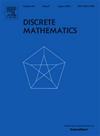q-Parikh matrices and q-deformed binomial coefficients of words
IF 0.7
3区 数学
Q2 MATHEMATICS
引用次数: 0
Abstract
We have introduced a q-deformation, i.e., a polynomial in q with natural coefficients, of the binomial coefficient of two finite words u and v counting the number of occurrences of v as a subword of u. In this paper, we examine the q-deformation of Parikh matrices as introduced by Eğecioğlu in 2004.
Many classical results concerning Parikh matrices generalize to this new framework: Our first important observation is that the elements of such a matrix are in fact q-deformations of binomial coefficients of words. We also study their inverses and we obtain new identities about q-binomials.
For a finite word z and for the sequence of prefixes of an infinite word, we show that the polynomial sequence converges to a formal series. We present links with additive number theory and k-regular sequences. In the case of a periodic word , we generalize a result of Salomaa: the sequence satisfies a linear recurrence relation with polynomial coefficients. Related to the theory of integer partition, we describe the growth and the zero set of the coefficients of the series associated with .
Finally, we show that the minors of a q-Parikh matrix are polynomials with natural coefficients and consider a generalization of Cauchy's inequality. We also compare q-Parikh matrices associated with an arbitrary word with those associated with a canonical word made of pairwise distinct symbols.
求助全文
约1分钟内获得全文
求助全文
来源期刊

Discrete Mathematics
数学-数学
CiteScore
1.50
自引率
12.50%
发文量
424
审稿时长
6 months
期刊介绍:
Discrete Mathematics provides a common forum for significant research in many areas of discrete mathematics and combinatorics. Among the fields covered by Discrete Mathematics are graph and hypergraph theory, enumeration, coding theory, block designs, the combinatorics of partially ordered sets, extremal set theory, matroid theory, algebraic combinatorics, discrete geometry, matrices, and discrete probability theory.
Items in the journal include research articles (Contributions or Notes, depending on length) and survey/expository articles (Perspectives). Efforts are made to process the submission of Notes (short articles) quickly. The Perspectives section features expository articles accessible to a broad audience that cast new light or present unifying points of view on well-known or insufficiently-known topics.
 求助内容:
求助内容: 应助结果提醒方式:
应助结果提醒方式:


